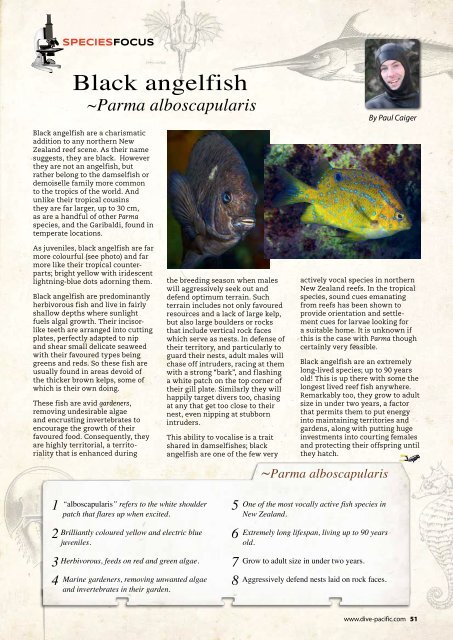Dive Pacific 171 Oct- Nov 2019
Create successful ePaper yourself
Turn your PDF publications into a flip-book with our unique Google optimized e-Paper software.
SPECIESFOCUS<br />
Black angelfish<br />
~Parma alboscapularis<br />
By Paul Caiger<br />
Black angelfish are a charismatic<br />
addition to any northern New<br />
Zealand reef scene. As their name<br />
suggests, they are black. However<br />
they are not an angelfish, but<br />
rather belong to the damselfish or<br />
demoiselle family more common<br />
to the tropics of the world. And<br />
unlike their tropical cousins<br />
they are far larger, up to 30 cm,<br />
as are a handful of other Parma<br />
species, and the Garibaldi, found in<br />
temperate locations.<br />
As juveniles, black angelfish are far<br />
more colourful (see photo) and far<br />
more like their tropical counterparts;<br />
bright yellow with iridescent<br />
lightning-blue dots adorning them.<br />
Black angelfish are predominantly<br />
herbivorous fish and live in fairly<br />
shallow depths where sunlight<br />
fuels algal growth. Their incisorlike<br />
teeth are arranged into cutting<br />
plates, perfectly adapted to nip<br />
and shear small delicate seaweed<br />
with their favoured types being<br />
greens and reds. So these fish are<br />
usually found in areas devoid of<br />
the thicker brown kelps, some of<br />
which is their own doing.<br />
These fish are avid gardeners,<br />
removing undesirable algae<br />
and encrusting invertebrates to<br />
encourage the growth of their<br />
favoured food. Consequently, they<br />
are highly territorial, a territoriality<br />
that is enhanced during<br />
the breeding season when males<br />
will aggressively seek out and<br />
defend optimum terrain. Such<br />
terrain includes not only favoured<br />
resources and a lack of large kelp,<br />
but also large boulders or rocks<br />
that include vertical rock faces<br />
which serve as nests. In defense of<br />
their territory, and particularly to<br />
guard their nests, adult males will<br />
chase off intruders, racing at them<br />
with a strong “bark”, and flashing<br />
a white patch on the top corner of<br />
their gill plate. Similarly they will<br />
happily target divers too, chasing<br />
at any that get too close to their<br />
nest, even nipping at stubborn<br />
intruders.<br />
This ability to vocalise is a trait<br />
shared in damselfishes; black<br />
angelfish are one of the few very<br />
actively vocal species in northern<br />
New Zealand reefs. In the tropical<br />
species, sound cues emanating<br />
from reefs has been shown to<br />
provide orientation and settlement<br />
cues for larvae looking for<br />
a suitable home. It is unknown if<br />
this is the case with Parma though<br />
certainly very feasible.<br />
Black angelfish are an extremely<br />
long-lived species; up to 90 years<br />
old! This is up there with some the<br />
longest lived reef fish anywhere.<br />
Remarkably too, they grow to adult<br />
size in under two years, a factor<br />
that permits them to put energy<br />
into maintaining territories and<br />
gardens, along with putting huge<br />
investments into courting females<br />
and protecting their offspring until<br />
they hatch.<br />
~Parma alboscapularis<br />
1<br />
2<br />
3<br />
4<br />
“alboscapularis” refers to the white shoulder<br />
patch that flares up when excited.<br />
Brilliantly coloured yellow and electric blue<br />
juveniles.<br />
Herbivorous, feeds on red and green algae.<br />
Marine gardeners, removing unwanted algae<br />
and invertebrates in their garden.<br />
5<br />
6<br />
7<br />
8<br />
One of the most vocally active fish species in<br />
New Zealand.<br />
Extremely long lifespan, living up to 90 years<br />
old.<br />
Grow to adult size in under two years.<br />
Aggressively defend nests laid on rock faces.<br />
www.dive-pacific.com 51


